- Home
- Anthony Doerr
Memory Wall: Stories Page 10
Memory Wall: Stories Read online
Page 10
They fight. He says she is detached. He says she is not good at dealing with grief. In her eyes leaves blow back and forth. Detached, Imogene thinks, and remembers a time-lapse video she saw once of a starfish detaching from a dock post and roaming the sea floor on its thousand tiny feet.
She retreats to the garage and runs her hands through her buckets of seeds.
He chops tires out of the yard until little stars burst behind his eyes. In a parallel world, he thinks, I’m a father of nine. In a parallel world I’m waiting beneath an umbrella for my children to come out of the rain.
The summer session winds down. The swimmer in the front row, Misty Friday, wants to conference about her take-home exam. Her tank top is sheeny and her shoulders are freckled and her hair is baled up in golden elastics. The classroom empties. Herb takes a seat in the desk beside Misty’s and she leans across the gap and they put their heads over a paragraph she has written about eukaryotes, and soon the building is completely empty. A lawnmower drones somewhere outside. Houseflies buzz against the windows. Misty smells like skin lotion and pool chlorine. Herb is looking at the perfect, fat loops of her cursive, feeling as if he is about to fall forward into the page, when he calls her—completely by accident—sweetheart.
She blinks twice. Licks her lips, maybe. Hard to tell.
He stumbles: “All cells have what, Misty? Cell membrane, cytoplasm, and genetic material, right? In yeast, mice, people, it doesn’t matter…”
Misty smiles, taps the tip of her pen against the desk, gazes down the aisle.
The mountains turn brown. Range fires ring the sun with smoke. Imogene finds herself unable to summon the energy to drive home from work. She cannot summon even the will to get up from her desk. Screensaver fish swim across the computer monitor and the daylight fades to dimness and then to black and still Imogene sits in her plastic chair and feels the weight of the building settling all around her.
A person can get up and leave her life. The world is that big. You can take a $4,000 inheritance and walk into an airport and before your heartache catches up with you, you can be in the middle of a desert city listening to dogs bark and no one for three thousand miles will know your name.
Nothingness is the permanent thing. Nothingness is the rule. Life is the exception.
It is almost midnight when she drives the dark road home and in the garage she leans against the steering wheel before going in and feels shame draw up her torso and leach through her armpits.
It should be straightforward, she thinks. Either I can have babies or I can’t have babies. And then I move on. But nothing is straightforward.
In August Herb gets an email from [email protected]. Subject: Neurons.
so if like you were saying the other day in class neurons are what make us feel everything we feel and each receptor works the same pumping those ions back and forth why do some things hurt and some things sort of prickle and some things feel cold?? what makes some things feel good professor ross and why if nerve fibers are what make us feel can I feel so MUCH without the receptor being stimulated at all professor ross without any part of me ever being touched at all??
Herb reads it again. Then again. It’s Wednesday morning and his piece of toast, slathered with strawberry jam, remains halfway to his mouth. He imagines replies: It’s complicated, Misty, or See, there are photoreceptors, mechanoreceptors, and chemoreceptors, or Let’s talk further, or, Friday, 4 p.m., my car, don’t worry because I CAN’T GET YOU PREGNANT, but then he imagines he could get her pregnant, that all he’d have to do is want to, a few words here, a smile there, her twenty-year-old ovaries practically foaming with eggs anyway, so healthy, so ripe, ova almost half the age of Imogene’s, basically outfitted with tractor beams, even his dying sperm, that feeble three percent, could make it in there. He thinks of Misty’s ankles, Misty’s collarbone; a twenty-year-old with glitter on her eyelids and a name like a weather forecast.
From the kitchen comes the sound of Imogene’s chair being pushed back. Herb deletes the message, sits red-faced in front of the screen.
Six months after Imogene returned from Morocco, they got married. He drove her to Montana for a honeymoon and led her up a trail beneath a string of ski-lift towers, a drizzle coming down on her bare arms and the dry grass swishing around her knees, and the procession of lift towers beneath them standing silently under the rain. He’d brought a bottle of wine; he’d brought chicken salad.
“You know,” he told her, “I think we’ll be married forever.”
Now it’s 2004 and they’ve been married almost eleven years. He submits the summer session’s final grades to the registrar and takes a corner stool at Cole’s and drinks a pitcher of sweet, dark beer.
Then he drives to the Corbett Pool. A few folks in short sleeves sit in the bleachers beneath a forty-foot mural of a cowboy. Misty Friday is easy to spot: taller than the rest of the women, sleek in a navy one-piece trimmed with white. Her bathing cap is gold. Herb sweats in his khakis. The swimmer in Misty’s lane makes the turn, starts back. Misty climbs onto a starting platform, lowers her goggles. Everywhere voices echo: off the ceiling, off the churning water. C’mon Tammy, Go Becky. It feels to Herb as though he is pumping through the interior of a living cell, mitochondria careering around, charged ions bouncing off membranes, everything arranging and rearranging.
And yet, from another perspective, everything is motionless. Misty’s knees are bent; her arms poised above her head. The moment before her teammate touches the wall, before Misty leaps, stretches out into a minute, an hour. The chlorine in the air touches the very back of Herb’s throat.
Misty enters the water; Herb hurries back to his truck. He tells himself it’s just biology, the chemical fist of desire, his spine quaking in it like a sapling. The truth. The questions. No transgression if there is no action. Isn’t that what they taught in Sunday school? Misty was right to wonder how people can make other people feel without touching one another.
He starts the truck toward home. The sun sinks behind Medicine Bow to the west and sends up streamers of gold and silver.
“You never know,” Herb’s mother once told him, the skin beneath her eyes streaked with mascara, “all the things that go into making a marriage last. You never know what goes on behind closed doors.”
When Herb walks inside, Imogene is sitting at the kitchen table with tears on her cheeks. In the fading light her hair is as white as ever, almost translucent.
“Okay,” she says. “I’ll do it. I want to try one more time.”
It’s early October before the clinic can schedule them in again. This time they know the nurses’ names, the schedule, the dosages; this time the language is not so impenetrable. The box of drugs is smaller; they already have specimen cups, alcohol wipes, syringes. Imogene pulls down the waistband of her pajamas; Herb drives in the first needle.
At Cyclops Engineering, receptionists string fake spiderwebs across the ceilings. Goss, the plant sciences professor, comes by Herb’s office with sandwiches: turkey, tomatoes, vinegar. He talks about his wife’s pregnancy, how she vomits in the kitchen sink, how his unborn daughter is the size of an avocado by now.
“Isn’t it crazy,” he says, “that every student in this school, every person in town, every single human who has ever lived, existed because of two people fucking?”
Herb smiles. They eat. “Be fruitful and multiply!” shouts Goss, and scatters shreds of lettuce across Herb’s desk.
At night Imogene dreams: She and Herb sit in a blind woman’s parlor on a floral print couch and drink cold tea and the blind woman asks them questions about their sexual history. Imogene’s mother walks in, dragging two old tires. The blind woman gives Imogene an ultrasound. Doves flutter against the ceiling.
Subcutaneous. Intramuscular. Herb unscrews the used needles, drops them in the sharps container. He lines up Imogene’s rosary of pills. Out in the yard a ground fog clings to the sage, sealing off the earth. A few finches swoop between feeders like ghosts.
>
At work Imogene tells Ed Collins, the regional manager, why she will need to miss more afternoons. She lifts the hem of her shirt and shows him the spectrum of injection bruises above her panty line like slow purple fireworks.
“I’ve seen worse,” he says, but both know this isn’t true. Ed has two daughters and a waterslide in his backyard and gets hopelessly drunk playing putt-putt golf every Friday night.
Fifteen miles away, at the kitchen table, Herb signs away his 401K.
Again Imogene’s ovaries swell. Again the season begins to turn; leaves blowing across the field of old tires, the sky seamed with a vast, corrugated backbone of cloud.
“So our two frogs make Baby Tadpole,” Herb tells his Thursday lab, “and Baby Tadpole will turn out like his parents but not exactly like them: Reproduction is not replication.”
After class he erases Baby Tadpole, then the arrows of descendancy, parent frog A, parent frog B. The body has one obligation, he thinks: procreate. How many male Homo sapiens are right now climbing atop their brides and groaning beneath the weight of the species?
Tomorrow, the doctor will go into Imogene and retrieve her eggs. Herb drives home, cooks chicken breasts. The roof moans in the wind.
“Do you think they’ll let me wear socks this time?”
“We’ll bring some.”
“Do you think all my hair will fall out?”
“Why would it do that?”
Imogene cries then. He leans across the table and holds her hand.
It starts to snow. It snows so much it seems the clouds will never empty of it and in the morning they make the sixty-six-mile drive in a whiteout and do not talk for any of it, not a single word. Trucks are overturned every few miles. The snow blows in hypnotic sheets through the headlights and the interstate looks as if it has ignited into ten-foot-tall white flames. Herb leans forward, squinting hard. Imogene cradles his sperm sample between her thighs. The heads of her ovaries sway heavily inside her. Something in the way the snow swirls and checks up and swirls again reminds her of the way she’d pray for snowy days as a girl, how she’d go through an Our Father and enunciate every word and she wonders how she can be a thirty-five-year-old orphan when just yesterday she was a nine-year-old in Moon Boots.
When Herb finally pulls into the clinic, they’ve been in the truck three hours. He has to pry his fingers off the wheel.
The anesthesiologist wears all black and is extremely short. They are late so everything goes very quickly.
“I’m just going to give you some candy now,” he tells Imogene through his mask, and drives the Pentothal in.
Herb tries to grade lab reports in the waiting room. Slush melts in dark pools on the carpet. No matter what, he tells himself, no matter how bad things seem to be going, someone always has it worse. There are cancer patients out there incandescing with pain, and toddlers starving to death and someone somewhere is deciding to load a pistol and use it. You ran a marathon? Good for you. Ever hear of an ultramarathon? It might be cold where you live but it’s colder in Big Piney.
After a while he gets called back in. He kneels beside Imogene in the RN’s office, refilling her cup of Gatorade, watching the lights in her eyes come back on. Fifty feet away, for the second time this year, an embryologist rinses Imogene’s eggs and weakens the zona pellucida and injects one good sperm into each one.
A nurse comes into the office, says, “You two are so cute together.”
“We don’t have it so bad,” Imogene hears Herb say, as he half walks, half carries her through the slush to the car. “We don’t have it bad at all.”
The sky has broken and the sun fuses the entire parking lot with light. In the truck she dozes, and dreams, and wakes up thirsty.
In Minnesota, across the country, Herb’s parents send prayers into the naked trees outside their bedrooms. Herb’s nephews toast Herb and Imogene with their milk. At Cyclops Engineering Ed Collins sets an African violet in a plastic pot on Imogene’s desk.
The telephone rings. Twenty fertilized eggs. Fourteen embryos. An entire brood. Imogene smiles in the doorway, says, “I’m the old woman in the shoe.”
Two days later, three embryos have divided into eight cells and look strong enough to transfer. The snow melts on the roof; the whole house comes alive with dripping water.
If there’s a sadness in this, Herb thinks, it’s about the embryos that don’t even make it three days, the ones that get discarded, lumpy and fragmented, rated unviable. Nucleated cells, wrapped in coronas like little suns. Little sons. Little daughters. Herb and Imogene, father and mother, the DNA already unzipped, paired, and zipped back up, proficiencies at piano playing and field hockey and public speaking predetermined. Pale eyes, veiny limbs, noses shaped like Herb’s. But not good enough. Not viable.
Herb and Imogene and the birds at the feeders and Goss the plant sciences professor and Misty Friday the swimmer—all of them were once invisible, too small to see. Motes in a sunbeam. A cross-section of a single hair. Smaller. Thousands of times smaller.
“The stars,” a junior high science teacher once told Herb, “are up there during the day, too.” And understanding that changed Herb’s life.
“Even if we get pregnant this time,” Imogene says, “you think we’ll stop worrying? You think we’ll have more peace? Then we’ll want to find out if the baby’s got Down syndrome. We’ll want to know why it’s crying, why it won’t eat, why it won’t sleep.”
“I’d never worry,” Herb says. “I’d never forget.” They drive the sixty-six miles back to Cheyenne. The doctor gives them photos of their three good embryos: gray blobs on glossy paper.
“All three?” he asks, and Imogene looks at Herb.
Herb says, “It’s your uterus.”
“All three,” Imogene says.
The doctor pulls on gloves, gets out the half-cooked spaghetti noodle. He implants the embryos. Herb carries Imogene to the truck. The interstate skims past, cinders chattering in the wheelwells. He carries her up to the bedroom. Her feet bump the lampshade. Her hair spreads across the pillow like silk. She is not supposed to get up for three days. She is supposed to imagine little seeds attaching, rootlets creeping through her walls.
In the morning, at the university, Herb hands out midterm exams. His students hunch in their rows of desks, snow on their boots, anxieties fluttering in their chests.
“All you have to do,” he tells them, navigating the rows, “is show me you understand the concepts.”
They look at him with open eyes, with faces like oceans.
Fifteen miles away, Imogene rolls over in bed. Inside her uterus three infinitesimal embryos drift and catch, drift and catch. In ten days, a blood test will tell if any of them have attached.
Ten more days. For now there is only the quiet of the house. The birds. The tires in the field. She studies her palms, their rivers and valleys. A memory: Imogene, maybe six years old, had broken her front teeth on the banister. Her father was looking for pieces of tooth in the hall rug. Her mother’s bracelets were cold against Imogene’s cheek.
The telephone starts to ring. Out the bedroom window a pair of slate-colored juncos flap and flutter at a feeder.
“Tell me it’s going to be okay,” Herb whispers, the receiver of his office phone clamped to his ear. “Tell me you love me.”
Imogene starts to tremble. She shuts her eyes and says she does.
The Demilitarized Zone
Paper my son has carried with him, touched a pen to. I press it to my nose but it smells like notebook paper, nothing more:
Dad—the birds. Sea eagles. Ducks like mallards only more beautiful. Egrets, but not like our egrets—taller, wilder. I watch them with the spotting scope and they look dirty and ragged, like deposed kings. They stab the mud with their long beaks.
I want to know their names—I ask everybody but no one knows or cares. I even shout questions at the North Koreans, but what do they know. Grandpop, I think, would know.
I’ve learned that the h
uge, short-tailed bird with the black neck is called a red-crowned crane. Ahn told me; he calls the crane turumi, bird of peace. But Northerners, he says, call it something else, something like “messenger of death.” He says the KPA have built huge birdfeeders that they stock with poisoned snails. Ahn hates the Northerners though, and it’s hard to know out here what is true and what is made up.
And then there is this diarrhea. Painful, awful. I haven’t been to the Doc. Don’t tell Mom. Tell her I’m fine.
“Pop,” I say, “wake up,” and I read him the letter. Between sentences I glance at his face, but there’s no way to tell if any of it is getting through. He blinks. He brings a hand to his mouth and adjusts his teeth.
Pop was in Korea, too. He spent twelve months there in 1950, doing things he never talked to any of us about, not once. Now, with the Alzheimer’s, I doubt he can recall much of it. Where do memories go once we’ve lost our ability to summon them?
It’s October here in Idaho, cardboard spiders taped up in store windows. I make Pop dinner, give him his bath, put him in bed. Before I fall asleep, I take a letter at random from the shoebox beside the bed and read:
Both sides have loudspeakers everywhere, in trees, on towers, and they blare propaganda at each other all night, so loud I doubt anyone can make any sense of it. Mom would hate it. Remember when we went to Seattle for Christmas and she had to sleep with cotton stuffed in her ears?
The next night I hear her keys in the lock, her boots in the hall. “I need to get into the crawlspace,” she hollers, and disappears into the basement. When she comes back up she is holding a blonde wig I have never seen before.
“For my costume,” she says. She goes to the freezer and pours herself a drink. I still don’t understand how any of this works: Can she just walk in here? Do I change the locks? A week ago I took all the photographs down, then put them back up, then took down just the ones with her in them.

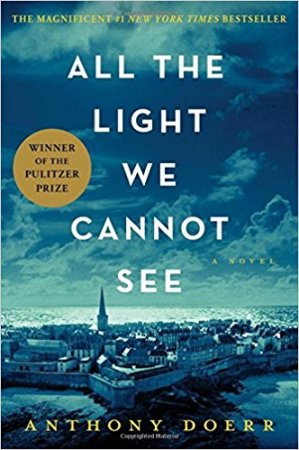 All the Light We Cannot See
All the Light We Cannot See About Grace
About Grace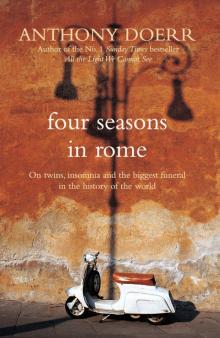 Four Seasons in Rome: On Twins, Insomnia, and the Biggest Funeral in the History of the World
Four Seasons in Rome: On Twins, Insomnia, and the Biggest Funeral in the History of the World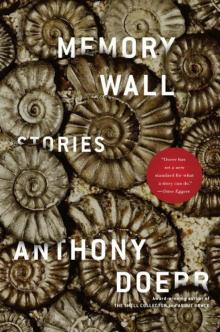 Memory Wall
Memory Wall The Best American Short Stories 2019
The Best American Short Stories 2019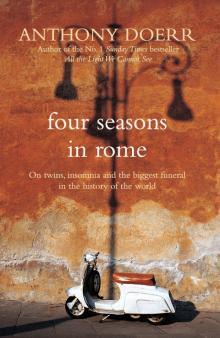 Four Seasons in Rome
Four Seasons in Rome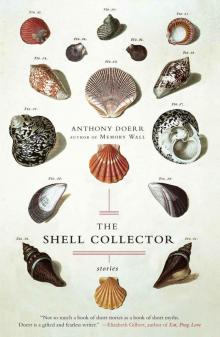 The Shell Collector
The Shell Collector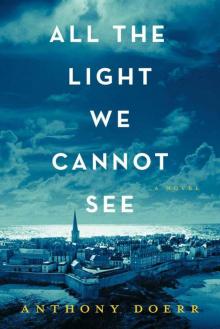 All the Light We Cannot See: A Novel
All the Light We Cannot See: A Novel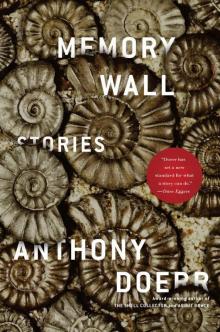 Memory Wall: Stories
Memory Wall: Stories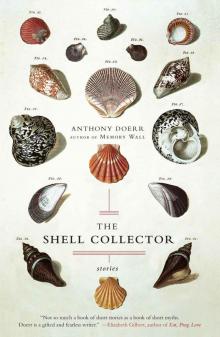 Shell Collector
Shell Collector